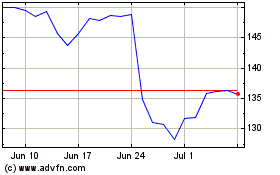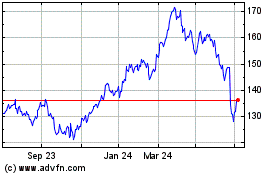France Sends Ship to Aid EgyptAir Search
May 27 2016 - 7:34AM
Dow Jones News
By Robert Wall
LONDON--France has sent a specially-equipped naval vessel to the
southeastern Mediterranean to help hunt for EgyptAir Flight 804's
so-called black boxes, French air accident investigators said.
The French navy's Laplace survey ship left the Corsican town of
Porto Vecchio Thursday headed for the suspected crash site of the
Airbus Group SE A320 plane, which crashed more than a week ago with
66 passengers and crew on board.
Its search will begin in a matter of days, the French air
accident investigation office, the BEA, said late Thursday, adding
that two of its investigators were on board the vessel. The BEA,
which is supporting the Egyptian-led crash probe, has extensive
experience with underwater searches.
The BEA said another ship with an underwater exploration robot
to recover items resting on the seabed may also be dispatched to
assist in the search.
The black boxes are equipped with underwater beacons to help
search teams find the cockpit voice and flight data recorders. The
Laplace is carrying three hydrophones to help detect the signal,
the BEA said.
The hydrophones can be dropped to a depth of 3,280 feet and
detect a signal from the black box "pingers" at a range of 2.5
miles, according to Alseamar, the French manufacturer of the
hydrophones.
The black boxes would provide the best clues what to cause the
plane suddenly to plunge into the ocean from an altitude of 37,000
feet as it flew to Cairo from Paris.
The duration of the search operations will depend on weather
conditions and the size of the area to be surveyed, the company
said Friday.
Egyptian officials said Thursday that search teams had detected
an emergency signal from the wreckage of the aircraft's fuselage, a
discovery that has enabled searchers to narrow the search zone for
the main body of the plane to a radius of about 3 miles.
No possible cause for the crash has been ruled out, Egyptian
officials leading the crash probe have said.
Investigators so far have been forced to work with limited and
inconclusive information. Egyptian investigators said Tuesday that
some of the Flight 804 wreckage already found had been sent to a
forensic lab for analysis, along with small fragments of human
remains for possible identification using DNA.
Flight 804 transmitted a small number of automated fault
messages shortly before all communication with the plane was lost.
That information suggested possible smoke on the plane.
With only a limited number of such messages in hand,
investigators have said they have drawn no conclusions about what
happened to the Airbus A320, underscoring the importance of
recovering the black boxes.
Egyptian search teams have yet to locate the fuselage and other
main parts of the aircraft. The French navy also has had another
ship in the area aiding the search for plane debris.
Locating the main body of wreckage would help investigators to
identify the nature of the damage to the plane and glean
information about how it crashed. Deformed metal can give clues on
whether a plane broke up midflight or landed in the sea intact,
according to air accident experts. It can also point to signs that
explosives were used.
Write to Robert Wall at robert.wall@wsj.com
(END) Dow Jones Newswires
May 27, 2016 07:19 ET (11:19 GMT)
Copyright (c) 2016 Dow Jones & Company, Inc.
Airbus (EU:AIR)
Historical Stock Chart
From Mar 2024 to Apr 2024

Airbus (EU:AIR)
Historical Stock Chart
From Apr 2023 to Apr 2024
